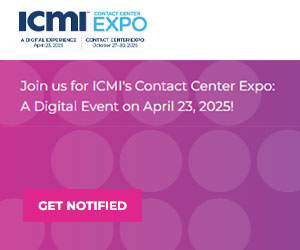Hervé Leroux at Odigo explores the millennial customer experience, and how companies must adapt to the consumers of tomorrow.
Coined in the American history book ‘Generations’, the term millennials was given to the generation of individuals born between 1980 and 1994 who became adults in the new millennium.
A large group of tech-savvy consumers, they have considerable influence on brands, who as a result must re-evaluate how best to meet these customers’ needs and values.
Three years after the start of the rapid changes brought on by the pandemic, to what extent have the changes met the needs of this particular demographic? What steps should companies consider next to tailor customer experiences for these consumers?
Millennials — an Influential Generation of Consumers
The term “millennials” is also used interchangeably with “Generation Y”, the first generation to become adults in the new millennium, and followed by Generation Z.
There were approximately 14.26 million millennials in the United Kingdom in 2020, the largest generational cohort.
Globally, they represent huge potential for businesses and look set to account for more than 40% of the world’s working-age population by 2030 as well as be the highest earners in terms of net income.
Millennials saw the birth of the internet and many new technologies, making them a tech-savvy, hyper-connected and mobile-first generation.
These customers utilise the internet and smartphones confidently on a daily basis to meet the demands of everyday life and relaxation. In 2022, smartphone ownership penetration was 100% for UK 25–34-year-olds.
Daily usage figures vary, but 2020 American data suggested millennials were spending 3.7 hours a day on their smartphones. Importantly for brands, this time includes engaging with customer experiences or touchpoints like streaming services, social media, browsing and buying.
If millennials represent enormous consumer potential for brands, customer experiences need to speak their language. Generation Y may be hyper-connected, but they want customer services that are authentic, efficient, fast, reliable and based on the latest technologies.
In terms of customer engagement, millennials are the least brand-engaged generation of all, as only a quarter of them are fully loyal to brands.
Moreover, 73% of them say they are likely to switch to a competing brand after just one bad experience. This clearly has implications for companies trying to build loyalty, meet expectations and anticipate the needs of these demanding customers.
Changes in the Consumption Habits of Millennials Since 2020
Major pandemic-related disruptions accelerated the adoption of new consumer and business strategies based on digital channels.
Societal changes too highlighted new needs and priorities, focusing daily life on becoming empowered in the home environment and using digital experiences to achieve more remotely.
For millennials, who were already used to new technologies, this resulted in acceleration and reinforcement of online consumption, especially for food shopping and the use of streaming platforms.
More impacted by the lack of social interaction, they also significantly increased their use of social media platforms.
Three years after the start of the pandemic, a large proportion of millennials have changed at least some of their purchasing behaviour and certain habits for good: click and collect, contactless payments and purchases made via social media.
Companies are still adapting their strategies to this new reality. In fact, according to Euromonitor International, the key to companies surviving and prospering in this new environment is to increase engagement with millennials, including ensuring that digital experiences remain at the core of their business.
Millennials’ New Expectations in Terms of Customer Experience
Digital channels are a foundational expectation for the millennial consumer, for whom speed and convenience are essential elements of customer experience.
According to a Zendesk study, when millennials contact a customer service department, 80% of them want an immediate response. CCaaS platforms offer tools to meet these needs.
To answer their questions quickly, self-service options are the ideal solution because they allow customers to find an answer to their problem on their own. In fact, 77% of buyers said they prefer to do their own research (checking review sites, searching on Google, etc.) rather than contact a sales representative.
The use of chatbots or virtual assistants is effective both in speeding up response times and providing 24-hour availability.
These solutions are perfectly adapted to customer service for younger generations for whom the use of these new technologies is intuitive.
Moreover, the same study shows that the COVID-19 crisis has encouraged the use of artificial intelligence (AI), with 39% of millennial customers feeling comfortable interacting with a chatbot and 62% of them preferring to interact with a virtual assistant rather than a human agent.
In addition to saving time, using chatbots to satisfy Generation Y is a way to control operating costs while also facilitating the work of contact centre advisors.
They allow time to be reallocated to more complex tasks, or even the needs of different customer generations for a more qualitative customer experience.
Communication Channels Adapted to Millennials’ Habits Improve the Customer Experience
Millennials can place quite a high value on personalisation, the right channels can therefore boost engagement. For these demanding and hyper-connected consumers, businesses need to adapt their strategies to include a choice of relevant communication channels.
Instant messaging (such as WhatsApp or Facebook Messenger), which is an integral millennial habit, is an innovative communication channel that is ideal for companies in the retail sector.
In addition to the advantages of speed and fluidity of interactions, they facilitate and optimise the work of agents. They allow the management of multiple simultaneous and asynchronous conversations, which help reduce waiting times and speed resolution.
With these spontaneous and personalised exchanges, companies can build a closer relationship with their customers and promote brand loyalty.
Social media also plays an important role in communicating with millennials. Presence on these high-traffic high-engagement platforms can cement brand image and values while also establishing a customer community.
A well-managed social media channel can help customers support each other with problem-solving, improve loyalty and organically reach new prospects.
Born at a key moment in history, millennials are looking for a balance between authenticity and immediacy.
That’s why companies must prioritise omnichannel in customer relations. One omnichannel way to promote customer engagement and maintain attention is with proactive outbound engagement.
Author: Guest Author
Published On: 14th Apr 2023
Read more about - Guest Blogs, Odigo



































